Following a light lunch at Bloomberg’s impressive new London offices, SPE Chairman Kevin Daly opened this year’s Annual Conference on 28 September 2018. The afternoon’s event was hosted impeccably by Bloomberg’s Chief Economist Stephanie Flanders. The five sessions covered a lot of ground and are summarised below.
Prof Philip Lane, Governor, Central Bank of Ireland
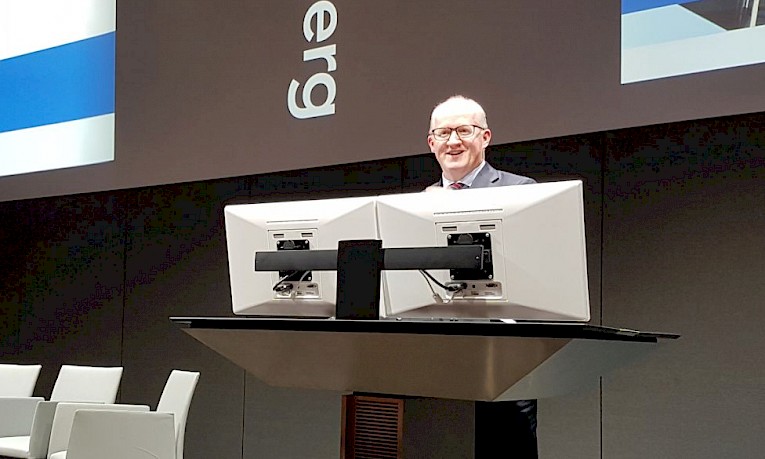
The Governor presented evidence looking at a variety of Phillips Curve estimates which showed that the chances of core inflation moving above 1.6% over time had risen – even if they do continue to point to less than a 50% chance of getting there by early 2021. Still, he argues this suggests there is “momentum” building in inflation. Professor Lane also talked about being “open minded” on the argument that inflation could pick up more sharply thanks to reduced labour market slack after having been subdued for some years (the “convexity” argument). The problem, he noted, was that forecasting is difficult when there have been few circumstances in the past like the euro area has experienced over the past decade from which to learn. The next stage for ECB policy, Professor Lane notes, could be to craft the time dimension/pace of lift off in relation to forward guidance.
Sir Dave Ramsden, Deputy Governor, Bank of England
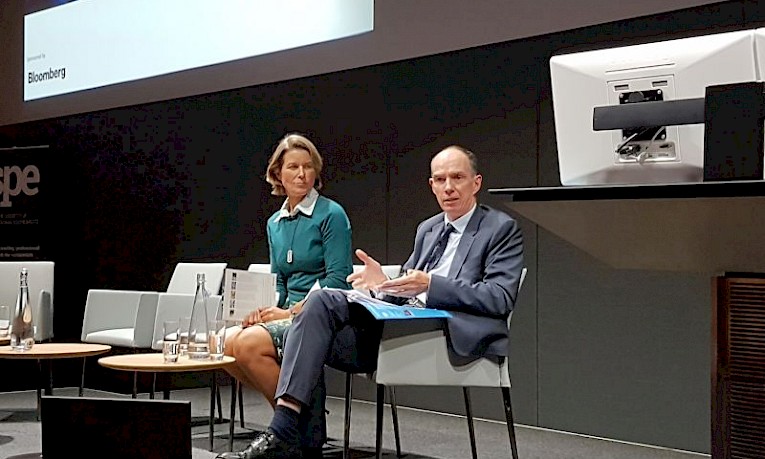
As for the economic outlook, Sir Dave discussed the tightness of the labour market and the likelihood that would seep into pay pressures and inflation in the period ahead. However, he also noted that the Bank had forecast such a move before which hadn’t come to pass, and that it would be foolish to rule out the possibility of another disappointment. Still, the past errors the Bank had made in forecasting unit labour costs had been smaller than those associated with average earnings, thanks to downside surprises to productivity. One source of significant uncertainty remained Brexit, where there were a range of downside tail risks which the market sees as higher than they were in the past. Sir Dave repeated comments made by Governor Mark Carney about the response of policy in the event of a bad Brexit outcome – much would depend on how the supply side responds as well as demand as to how accommodative the Bank could be.
Robert Chote, Chairman, Office for Budget Responsibility
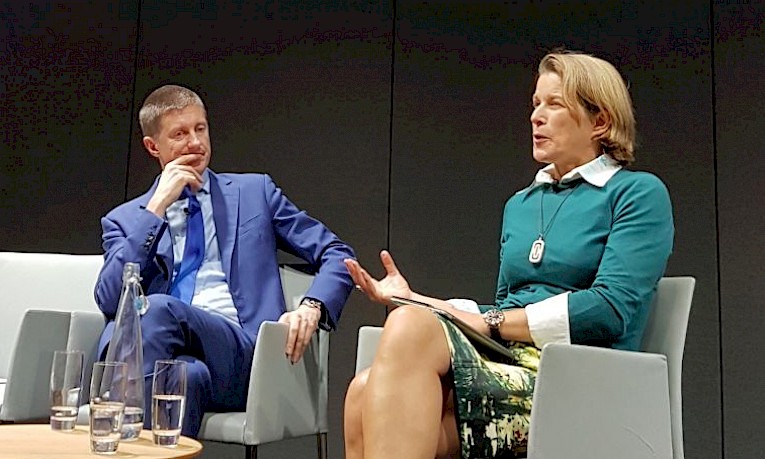
On the receipts side, significant complications can arise from early payments of self-assessment income tax, while variations in annual bonuses also cause regular headaches for the OBR forecasting team. On the spending side departments can often spend increased amounts of untapped resources as the end of the fiscal year approaches, while contributions to the EU budget can vary depending on adjustments made in relation to the size of the economy (relative to the other EU27). Finally, revisions can occur to the published data for months after the initial publication, not least because even some of the initial outturns are based on official forecasts themselves.
Global panel
Stephanie Flanders chaired a global panel of four economists who discussed some of the world’s pertinent economic issues. Jari Stehn (Senior Global Economist, Goldman Sachs) began by noting that despite various global geopolitical and economic concerns he was constructive on global growth. He argued that the Fed may need to raise rates by more than currently expected to prevent an economic overheating, thanks to above trend growth and below normal unemployment rates. Core inflation momentum was becoming stronger and rates, he suggested, were not restrictive (equilibrium interest rates are not as low as some economists think, he said). His primary concern was a tightening of financial conditions from a sizable escalation in protectionism.
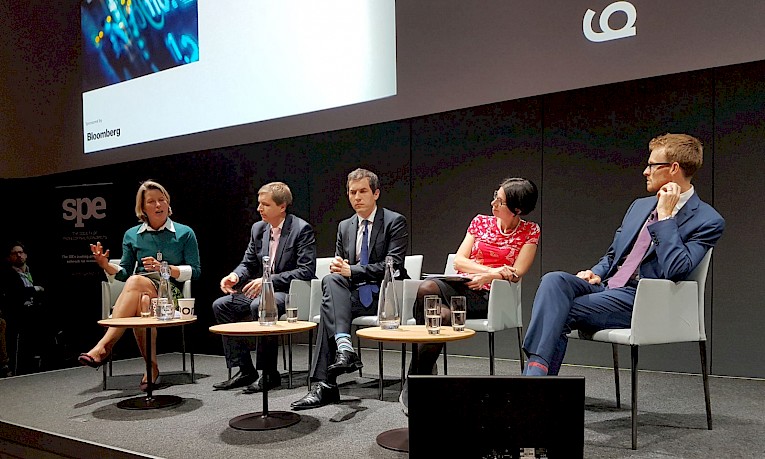
Rain Newton-Smith (Chief Economist, CBI) began by talking about Brexit and stating the concerns among businesses of a no-deal scenario. Risks, she said, had risen in recent weeks of such an eventuality and there was an increased sense of urgency. Citizens’ rights under Brexit had been clarified but suggested that they were not widely understood. When it came to the Northern Ireland border she argued that economists had failed to think fully about how the politics and economics would collide in relation to Brexit. As a final point Rain talked about the risk of oil prices on growth, particularly with the possibility of increased volatility and prices relative to current levels.
Jamie Murray (Chief European Economist, Bloomberg) completed the panel line-up, beginning by talking about the unemployment rate in Europe’s periphery falling sharply. European Commission estimates of the natural rate of unemployment in Spain meant that if one believed this number the Spanish economy could be seen as overheating at current levels of unemployment! And if the unemployment rate were to move back to its pre-crisis levels that could mean significant upward pressure on wages. On the issue of Brexit, Jamie said that bookmakers were quoting the risks of a no-deal scenario at a high level of over 60% - and that brought with it a high chance of serious economic disruption.
Evan Davis (BBC)
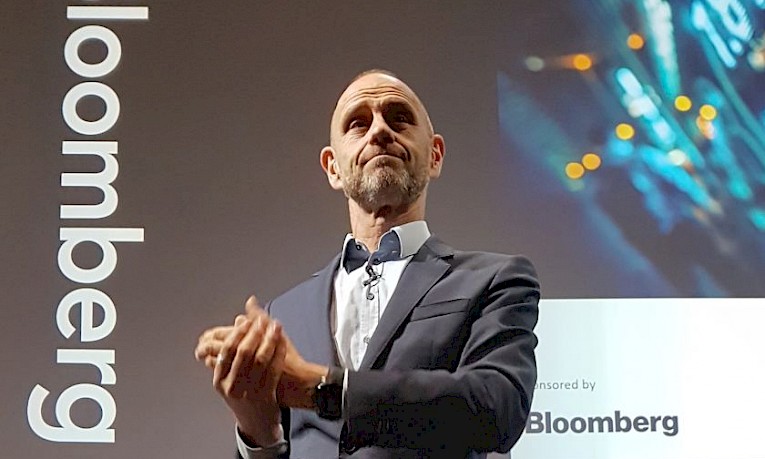
George Buckley, SPE Council.
Related pages
Speaker Series: Philip Lane, Governor of the Central Bank of Ireland
Speaker Series: Robert Chote, Chairman Office for Budget Responsibility
Speaker Series: Jari Stehn & Tom Orlik,
Speaker Series: Interview with Evan Davis
Speaker Series: Interview with Stephanie Flanders
Related links
Sponsored by: Bloomberg

